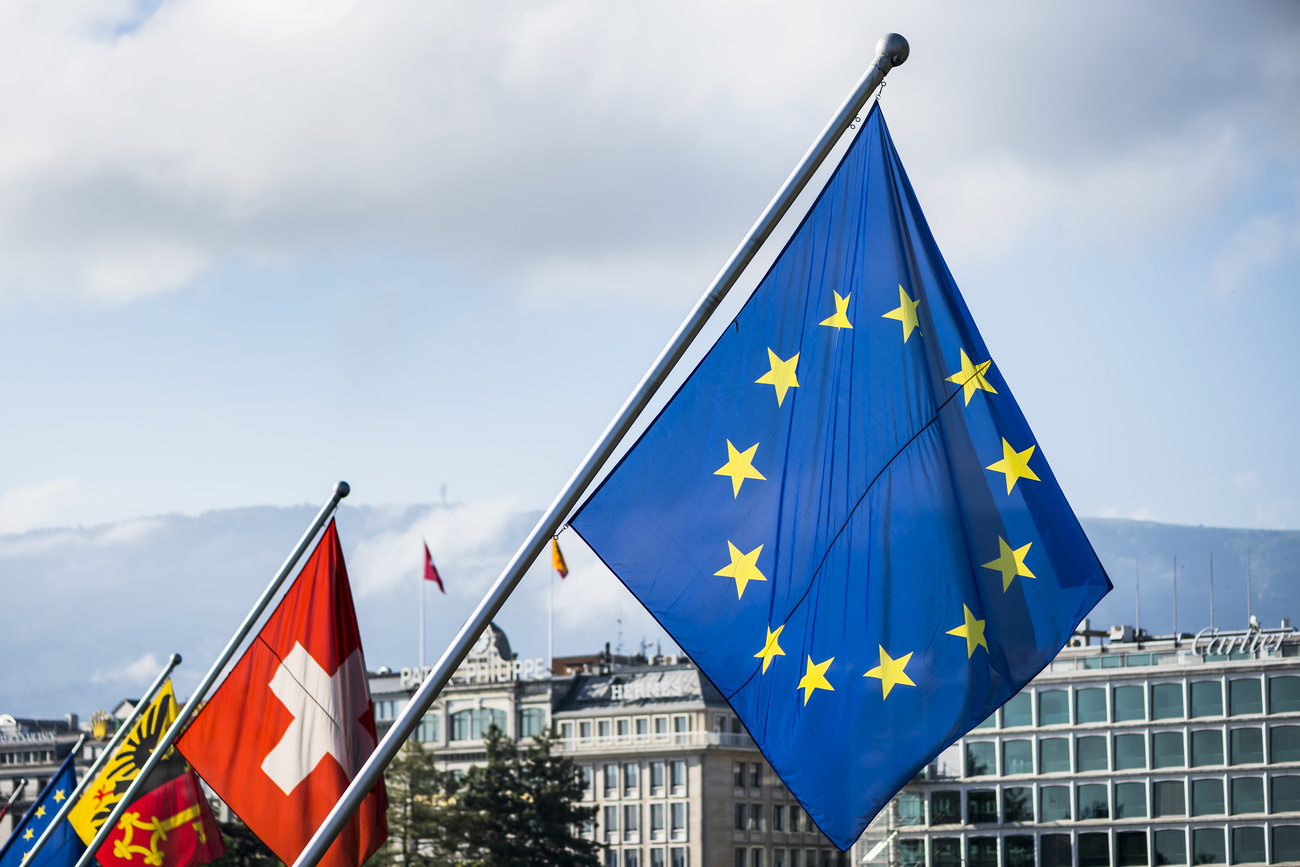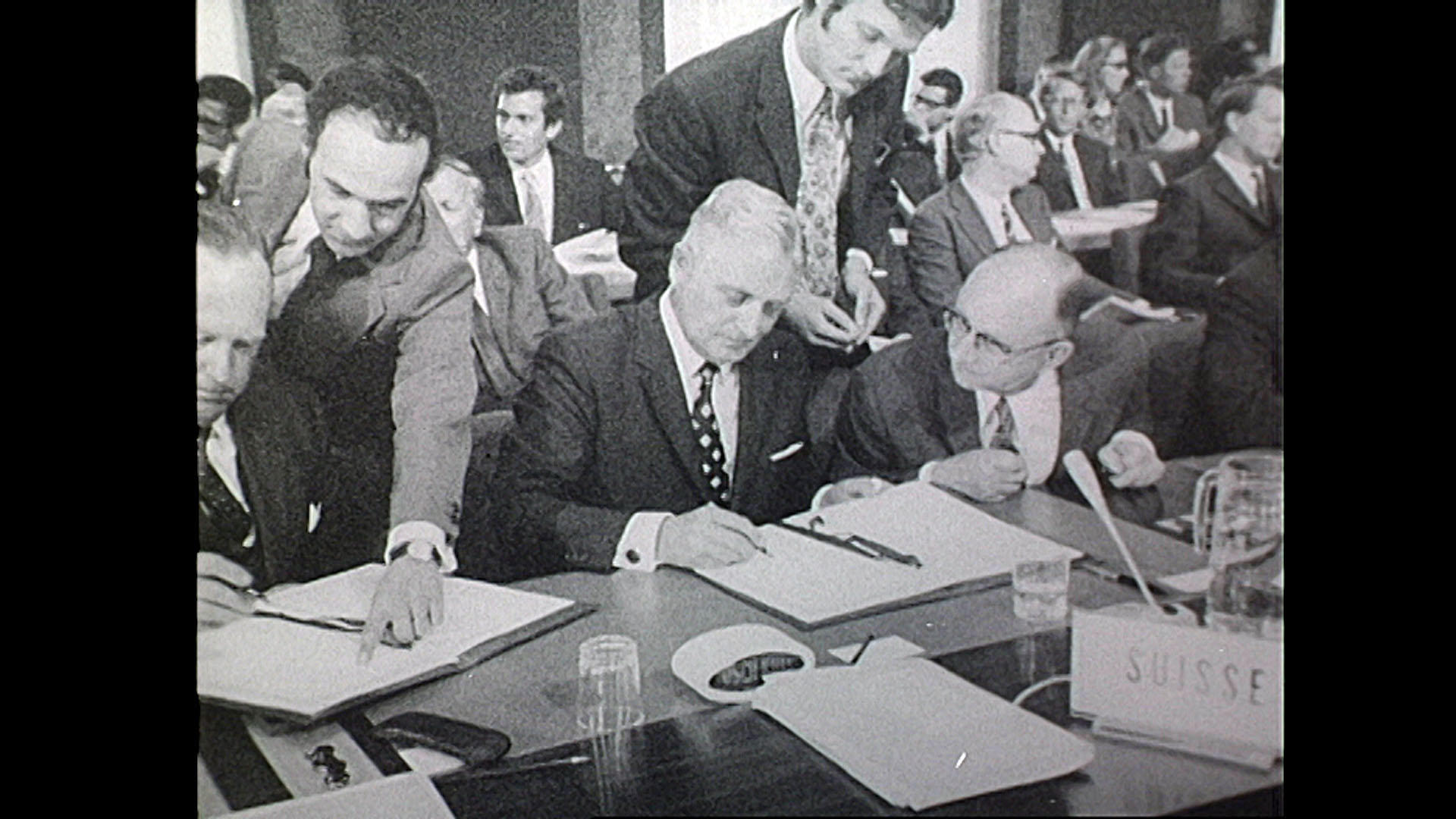
Media reacts to uncertain aftermath of EU deal failure

A “huge waste”, “punk politics”, or the “right decision”? The press is divided about the Swiss government’s decision to break off negotiations on a framework agreement deal with the European Union.
A front page cartoon in the Le Temps newspaper on Thursday shows Foreign Minister Ignazio Cassis, à la Sisyphus, faced with the problem of pushing a huge (EU) rock up a hill. Unlike the Greek legend, Cassis has abandoned his task half-way up: “let’s drop it”, he says. The rock, however, is rolling ominously back down the hill towards him…
The paper’s editorial writer is also not kind towards Cassis, who along with other ministers announced yesterday the definitive end of years of negotiations towards a Swiss-EU treaty to regulate long-term ties.

More
Swiss reject framework agreement deal with EU
The foreign minister’s promised “reset” of EU relations in 2018 has turned out to be a “flop”, the paper writes, and his “continued procrastination unsettled his colleagues and Swiss political circles alike”, Le Temps said.
However, ultimately it’s the government as a whole that is to blame for what the paper calls a “huge waste” of 15 years of discussions. The government, it says, initially did not take seriously enough the concerns of trade unions about salary protections, and was later “alarmed” by the unified opposition of the left and the right to the framework deal.
“Divided, the Federal Council [government] never spoke with a single voice and lacked leadership”, the French-language daily says.
‘Punk’ politics
The Tribune de Genève also calls the decision to stop negotiations a “waste”. Switzerland’s stance on Europe brings to the editorial writer’s mind the behaviour of a “punk”: dropping the possibility of a clear framework within which to work, and simply moving into an unknown future.
Such punk policy has meant Switzerland “cannot concretely lay out the advantages and disadvantages of developing relations with the EU – its main economic partner, its cultural sibling, its neighbour”, the paper writes.
Faced with such an unknown after yesterday’s announcement however, the impetus is now on the country’s leaders to lay out what the future will look like, to “at least give some perspective to a generation getting ready to enter a disrupted job market, in a climate crisis – this generation needs to imagine a future”, it concludes.

More
Newsletters
The Neue Zürcher Zeitung (NZZ) is also miffed about the future. It writes on Thursday that the government, driven more by what it didn’t want rather than what it did want, “lacked a convincing vision” on the dossier.
The NZZ had many questions: “How could and should [Switzerland] now perceive its political and economic place at the heart of Europe?” “What happens when the pragmatic compromise of the bilateral deals isn’t available anymore?” “How much can Switzerland remain economically and geopolitically an island?”
With the options narrowing between full EU or European Economic Area (EEA) membership and mere “third-country” status, the paper writes, “Switzerland will not be able to avoid having to clarify its relationship to the EU and to the rest of the world”.
While various newspapers in other European countries carried news of the Swiss decision, not so many have commented on it. Here is a selection that have:
The Brussels-based magazine POLITICO reckons that economic problems could lie ahead for Switzerland. It also writes that Brexit, which some hoped could benefit the Swiss position, has had the opposite effect – the EU has not become more flexible in its position towards Switzerland as a result of the British exit.
For the Financial Times, the decision of Bern will indeed be noticed in Great Britain, where authorities are still trying to shape the course of their relations with the EU. The FT also noted that talks on the framework deal “became more urgent after Brexit because of EU concerns the UK could seize on the Swiss model as evidence it should be able to cherry-pick benefits of the single market while remaining outside formal EU structures.”
The German Frankfurter Allgemeine Zeitung (FAZ) is clear: “Switzerland is cutting the bridge to Europe”. For the FAZ, access to the European single market is likely to become more complicated and more expensive for the Alpine nation.
For the Süddeutsche Zeitung, meanwhile, the decision raises the spectre of a “Schwexit”, with relations set to gradually erode. “With the breaking off of negotiations, it’s now clear that Bern and Brussels must make an entirely fresh effort to regulate their relations”, it writes.
Finally, the German Südkurier is relieved that for cross-border workers (around 62,000 Germans are registered as such in Switzerland), yesterday’s news will not change anything. However, it says, there could be negative knock-on consequences for the economy in southwestern Germany.

More
Swiss-EU relations: the key milestones
‘Right decision’
It wasn’t all doom and gloom in the Swiss press, however. The Blick tabloid praised the government for sticking to its guns and resisting the “promises” of Brussels for lucrative economic gains in exchange for closer partnership. In breaking off the negotiations, the Blick writes, the Federal Council (executive body) has taken its responsibility to clearly communicate that talks have failed.
A Tages Anzeiger editorial also says it was “the right decision”. Though the deal was based on a “good idea”, and with all respect for the “overcoming of national borders, which have led to so many wars in Europe”, it’s not an obligation to “sign everything that Brussels wants”, it says.
The deal would have not only obliged Switzerland to respect the rules of the single market, it writes. It would also have brought about a change in social security and employment rules to make Swiss rules compatible with the European Court of Justice; this would have “made a mockery of our system of direct democracy when it comes to vital issues”.
However, in the image of much of the rest of the press, it also writes that saying “no” is not enough anymore. “Left-wing trade unions and right-wing economic groups, happy about the failure of this deal, now have to come together and come up with a common Plan B that can take us into the future.”
“Now we [meaning diverse Swiss interests] all have to come to an agreement on what we want”.
With input from Sibilla Bondolfi, swissinfo.ch

In compliance with the JTI standards
More: SWI swissinfo.ch certified by the Journalism Trust Initiative


















![The four-metre-long painting "Sonntag der Bergbauern" [Sunday of the Mountain Farmers, 1923-24/26] had to be removed by a crane from the German Chancellery in Berlin for the exhibition in Bern.](https://www.swissinfo.ch/content/wp-content/uploads/sites/13/2025/12/01_Pressebild_KirchnerxKirchner.jpg?ver=1ea8acae)











You can find an overview of ongoing debates with our journalists here . Please join us!
If you want to start a conversation about a topic raised in this article or want to report factual errors, email us at english@swissinfo.ch.